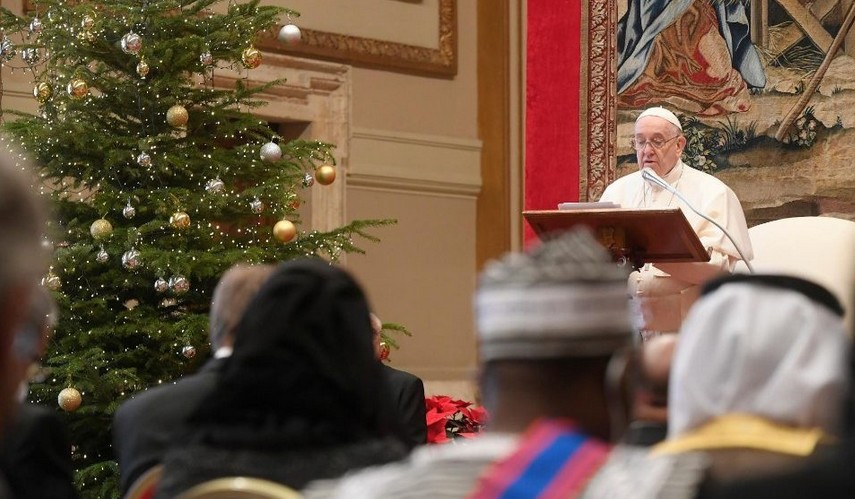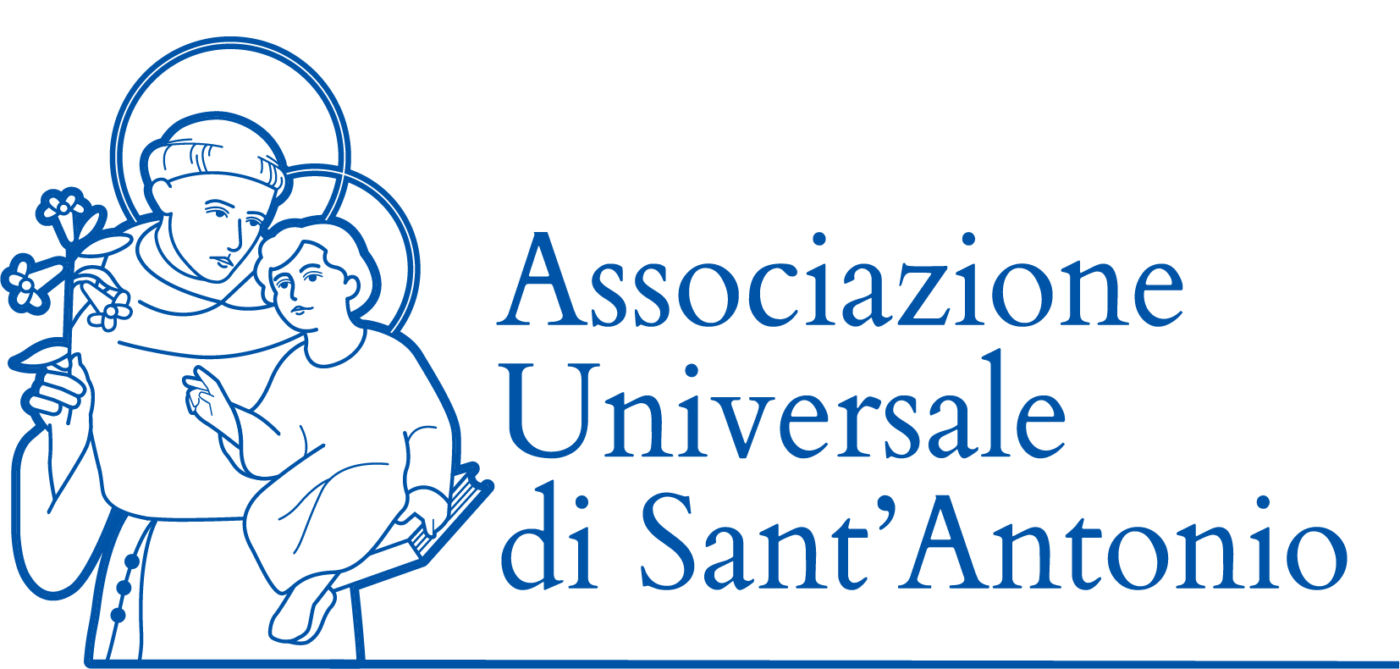Pope Francis’s “state of the world” address highlighted critical issues of human and geopolitical concern across the world, hinging on the fact that we are one human family, inhabiting a common home and that, to be able to tackle the urgent problems of our time, we need to recover a sense of the profound unity of all reality.
Speaking to the Members of the Diplomatic Corps accredited to the Holy See, gathered in the Vatican for their yearly audience, the Pope reminded them that their overriding goal should be to help resolve disagreements and foster harmony.
First, he highlighted the ongoing pandemic, and its direct and collateral effects on humanity, saying the health crisis “still calls for a significant effort on the part of everyone.”
He lamented how the fight against the virus has been undermined in many cases by strong ideological divides that have “severed the bond of human reason with the objective reality of things.”
Tackle the pandemic “head-on”
Calling on leaders and citizens to confront the problem “head-on”, the Pope said a political commitment is needed to pursue the good of the general population through measures of prevention and immunization. He added that “a comprehensive commitment on the part of the international community is necessary so that the entire world population can have equal access to essential medical care and vaccines.”
He appealed to governments and concerned private entities to demonstrate a sense of responsibility, “developing a coordinated response at every level (local, national, regional, global), through new models of solidarity and tools to strengthen the capabilities of those countries in greatest need.” The Pope also urged all states “to adopt a policy of generous sharing as a key principle to guarantee everyone access to diagnostic tools, vaccines and drugs.”
Apostolic visits and the suffering of Lebanon
As he always does during this important yearly speech, Pope Francis went on to mention some of the areas most affected by conflict, political division, the impact of climate change and poverty.
He spoke of the suffering of the people of Lebanon calling for “necessary reforms and the support of the international community,” which he said will “help the country to persevere in its proper identity as a model of peaceful coexistence and brotherhood among the different religions.”
And mentioning his Apostolic Visits undertaken in the course of 2021, Pope Francis recalled Iraq, Budapest, Slovakia, Cyprus and Greece. He said they were precious moments of encounter and sharing and opportunities for ecumenical and interreligious dialogue.
Migration
His visit to the island of Lesbos in Greece, he said, was an occasion to witness the generosity of all those working to provide hospitality and assistance to migrants, and the suffering of those who are forced to leave behind their homelands and their loved ones and undergo the dangers of perilous journeys and the fear of an uncertain future.
“Before those faces, we cannot be indifferent or hide behind walls and barbed wires under the pretext of defending security or a style of life,” he said.
Acknowledging the difficulties that some states encounter in the face of a large influx of people, the Pope reiterated his call to governments and to the European Union “to adopt a coherent and comprehensive system for coordinating policies on migration and asylum, with a view to sharing responsibility for the reception of migrants, the review of requests for asylum, and the redistribution and integration of those who can be accepted,” implementing sound models for a “farsighted approach to the global challenges before us.”
His attention however was not only for those who arrive on Europe’s shores in search of safety and development, but also for those who have fled Syria, Afghanistan and the massive migration movements on the American continent, “which press upon the border between Mexico and the United States of America. Many of those migrants are Haitians fleeing the tragedies that have struck their country in recent years.”
“The issue of migration, together with the pandemic and climate change, has clearly demonstrated that we cannot be saved alone and by ourselves: the great challenges of our time are all global,” he said.
The value of multilateralism
Pope Francis stressed the need to recover a “sense of shared identity as a single human family”, and decried what he sees as a crisis in multilateral diplomacy that leads to “the reduced credibility of social, governmental and intergovernmental systems.”
The Pope expressed concern for the fact that too often important resolutions, declarations and decisions are made without a genuine process of negotiation in which all countries have a say. He added that this has led to an imbalance that has generated disaffection towards international agencies and weakened “the multilateral system as a whole, with the result that it becomes less and less effective in confronting global challenges.”
Calling for a multilateral diplomacy that is “truly inclusive, not canceling but cherishing the differences and sensibilities that have historically marked various peoples,” the Pope said that in this way “it will regain credibility and effectiveness in facing the challenges to come, which will require humanity to join together as one great family that, starting from different viewpoints, should prove capable of finding common solutions for the good of all.”
Once humanity’s fundamental values are adopted through dialogue and consensus, he said, we realize that they rise above consensus: “Here I wish to mention in particular the right to life, from conception to its natural end, and the right to religious freedom.”
Care for our Common Home
A mention of the agreement reached in Glasgow at the COP26 called for more commitment towards the urgent care for our common home.
In that occasion, the Pope said, several steps were made “even though they were rather weak in light of the gravity of the problem faced.” He also expressed hope that decisions be further consolidated in view of COP27 planned for Egypt next November: “Much still remains to be done.”
World hotspots
Reiterating his belief that the suffering of people across the globe is of concern to the entire human family, the Pope called on the international community to “address the urgent need to find solutions to endless conflicts that at times appear as true proxy wars.”
He mentioned Syria where political and constitutional reforms are required for the country to be reborn, and where the “imposition of sanctions should not strike directly at everyday life, in order to provide a glimmer of hope to the general populace, increasingly caught in the grip of poverty.”
He called the conflict in Yemen “a human tragedy that has gone on for years, silently, far from the spotlight of the media and with a certain indifference on the part of the international community, even as it continues to claim numerous civil victims, particularly women and children.”
He lamented the lack of progress in the peace process between Israel and Palestine expressing his hope the two people may be able to “live in two states, side by side, in peace and security, without hatred and resentment, but the healing born of mutual forgiveness.”
Other sources of concern he spoke of “are the institutional tensions in Libya, the episodes of violence by international terrorism in the Sahel region, and the internal conflicts in Sudan, South Sudan and Ethiopia.”
The Pope also turned his attention to the “profound situations of inequality and injustice, endemic corruption and various forms of poverty that offend the dignity of persons also continue to fuel social conflicts on the American continent, where growing polarization is not helping to resolve the real and pressing problems of its people, especially those who are most poor and vulnerable.”
With a gaze on Europe, he called for lasting solutions for Ukraine, the southern Caucasus, and the Balkans.
“Dialogue and fraternity are all the more urgently needed for dealing wisely and effectively with the crisis which for almost a year now has affected Myanmar; its streets, once places of encounter, are now the scene of fighting that does not spare even houses of prayer,” he said.
Disarmament
Pope Francis noted that these conflicts are exacerbated by the abundance of weapons and the “unscrupulousness of those who make every effort to supply them.”
He called for disarmament and expressed his hope for new commitments between parties to the Treaty on the Non-Proliferation of Nuclear Weapons, which was to meet in New York in these days, and “was once again postponed due to the pandemic.”
“A world free of nuclear arms is possible and necessary,” he said, reiterating the Holy See’s position “that in the twenty-first century nuclear arms are an inadequate and inappropriate means of responding to security threats, and that possession of them is immoral” and “threatens the very existance of humanity.”
Education and labour
Finally, Pope Francis recalled his Message for the World Day of Peace celebrated on 1 January, highlighting the factors he considers essential for promoting a culture of dialogue and fraternity.
Education, he said, holds a special place. It is “the primary vehicle of integral human development, for it makes individuals free and responsible.”
Not neglecting to mention and condemn the crime of sexual abuse that has taken place in places of education run by the Catholic Church, the Pope said “no society can ever abdicate its responsibility for education. Yet, regrettably, state budgets often allocate few resources for education, which tends to be viewed as an expense, instead of the best possible investment for the future.”
Also referring to his 1 January message, the Pope highlighted labour “an indispensable factor in building and keeping peace”, noting it has been sorely tested by the pandemic which has caused many workers to experience job loss, exploitation and economic uncertainty.
“The number of people falling under the category of extreme poverty has shown a marked increase,” he said.
“Here, too," Pope Francis concluded, “greater cooperation is needed among all actors on the local, national, regional and global levels.” He expressed his hope that the coming years will be a time of opportunity” to consolidate the fraternal ties of our one human family in the awareness that no one is saved alone.
Diplomatic Corps accredited to the Holy See
There are currently 183 countries that maintain diplomatic relations with the Holy See. To these must be added the European Union and the Sovereign Military Order of Malta.
There are 87 Embassy Chancelleries based in Rome, including those of the European Union and the Sovereign Military Order of Malta. The offices of the League of Arab States, the International Organization for Migration and the United Nations High Commissioner for Refugees are also based in Rome.


 Italiano
Italiano Français
Français
